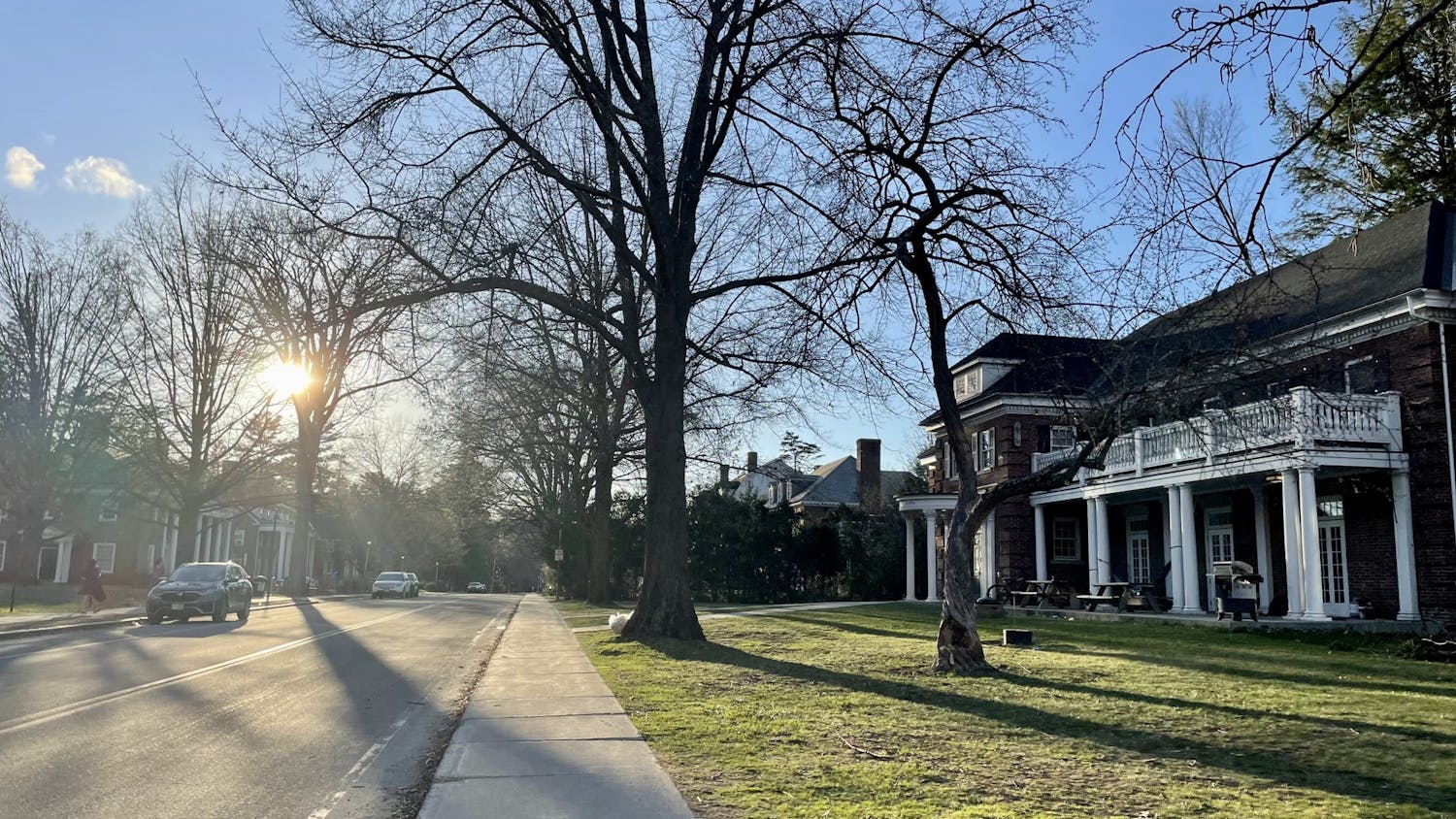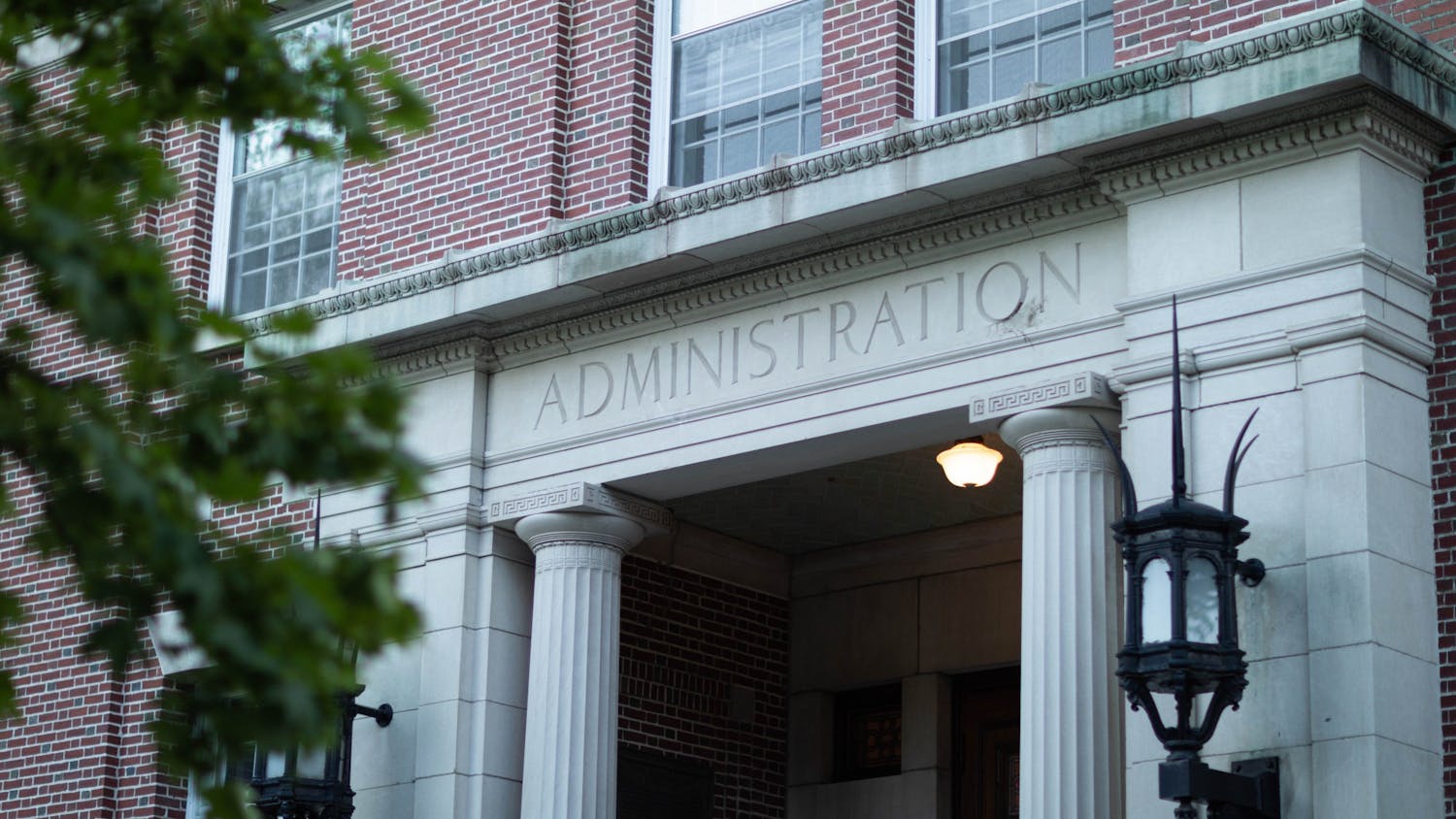This article is featured in the 2023 Commencement & Reunions special issue.
Amongst the elm and maple trees, memories tinted with the golden age of youth are made through traditions transcending generations, kept alive with Dartmouth’s Greek life. Yet despite the synth sparkles, the bass shaking the floor and the flashing magenta lights that seem to seep into the walls, Dartmouth’s Greek life formulates a unique spirit of community that contributes across all aspects of campus culture — even beyond the sphere of a party scene. In particular, there has been a recent movement within Greek spaces to make these spaces more accessible than they have been historically on campus.
Tevita Moimoi ’24, the current president of Gamma Delta Chi fraternity, discussed what the fraternity means to him: a diverse brotherhood that establishes companionship across athletic communities and ethnicities.
Moimoi identifies as Tongan, and said he takes “big pride in being present” with GDX’s DEI efforts. He stated that the “diversity in sports teams also plays into [GDX’s] diversity,” adding that this is what enables GDX to offer a safe and diverse environment.
“I want to make sure the message gets out there that we are not just football [players], but we’re basketball, we’re sailing, we’re track,” Moimoi said. “But you don’t have to worry about being involved in any of that — we [will] still appreciate you as one of us: a brother of a fraternity.”
The house’s range in members across and beyond the athletic community helps create bonds, connection and brotherhood between members that may not have otherwise met each other, Moimoi said.
Fraternities at Dartmouth have traditionally been more exclusive than they are today. Historical records from as early as 1898 detail Dartmouth fraternities discriminating against potential new members on account of the student’s race or religion. However, Greek life on campus is no stranger to reform efforts throughout Dartmouth history, some even seeking its abolition. These efforts often seek to right past wrongs — and current reforms are seeking to make amends to issues of diversity and exclusion.
Dartmouth’s Iota Kappa Chapter of national sorority Alpha Phi has sparked national change and influence across diversity, equity and inclusion training efforts, according to Sam Carranza ’22. Carranza was the first vice president of DEI at Iota Kappa’s APhi, and said that the Iota Kappa chapter was one of the first chapters of the national sorority to integrate conversations and efforts surrounding DEI.
“The goal was to create a platform in which every member of our house felt loved, heard and accepted for every aspect of their identities,” she said.
Carranza said the establishment of Alpha Phi International’s Collegiate Committee On Diversity, Equity and Inclusion was in part influenced by the work of the Iota Kappa chapter. In October 2020, Alpha Phi International initiated a new executive structure, which implemented the position of Vice President of DEI. The position includes educational modules and resources to facilitate productive DEI conversations and efforts within houses around the nation.
Due to the “extensive network of people across the world” that APhi offers, Dartmouth’s sisters are allowed to “play a role in bringing about wide-scale change” through “connecting with like-minded women from other chapters,” Carranza said.
Founded in 1993, Kappa Delta Epsilon sorority is one of Dartmouth’s first local sororities. KDE president,Vicky Escalona ’24 highlighted KDE’s contribution to campus as a place for women at Dartmouth from all different interests and backgrounds.
“You can have a lot of identities and factors to yourself and still find your own place in KDE,” Escalona said. “Everyone has such different interests. There’s a lot of athletes, but then there [are] also a lot of girls who are in performance groups or into theater.”
Escalona said that KDE’s emphasis on individuality is what helps KDE provide “a space to find a community — not because of any specific identity — but because the girls that are in it share the same values, support each other and love each other. When we’re in our space, we’re in it as if we’re paying attention to connecting with each other and our contributions to the house, and there’s nothing else on our minds. ”
Despite such efforts, however, Carranza mentioned that sororities “were not originally meant for women of diverse and underrepresented backgrounds.”
Indeed, sororities at Dartmouth have historically not always been such inclusive spaces and remain imperfect today. Students who completed the rush process have reflected on the performative aspects of DEI. Meanwhile, some queer students have found a space in sororities, despite the heteronormative aspects of certain events. In 2020, the four local sororities at Dartmouth voted to accept non-binary and gender non-conforming people in their bylaws, while the four national chapters remained restricted by “national policies that limit membership only to self-identifying women,” according to past reporting from The Dartmouth. These developments only make DEI more relevant, especially since these conversations are still ongoing.
APhi President Harley Kell ’24 described some of the DEI work, training and events the Iota Kappa chapter does. APhi has a DEI task force — composed of a group of members who “meet to discuss concerns, brainstorm solutions and plan DEI events for the house.”
Escalona further emphasized how DEI efforts have slowly just become a part of Greek life: “every year it just becomes a more natural part of the way [KDE] run[s] the house.”
Carranza added that she hopes that one of the most significant legacies of APhi’s DEI work is that it inspires other spaces to have similar conversations. “We have been able to hold events and workshops with other Greek spaces with the intention of furthering the work we’ve done so far.”
Outside of the Inter-Sorority Council, Dartmouth’s chapters of the National Pan-Hellenic Council are institutions that have created safe spaces for sisterhood and brotherhood within Dartmouth’s Black communities.
The Pi Theta chapter of Delta Sigma Theta Sorority, Inc. is a historically Black Greek Sorority and Public Service Organization meant to develop Black communities internationally. The current president of Delta Sigma Theta, Danelia Gossop ’23, discussed the legacy, mission and contributions of the sorority, which was chartered on April 28th, 1985.
According to Gossop, the chapter was founded on Dartmouth’s campus “by 14 collegiate women” who “saw a need for a vehicle through which concerns of women could be expressed at a predominantly white institution.” She asserted that Delta Sigma Theta is “an organization of college-educated women committed to the constructive development of its members and public service, with a primary focus on the Black community.”
Gossop stated that the sorority aims to serve the student body and those in the surrounding Upper Valley. She described the sorority’s values as “sisterhood, scholarship, service and social justice” and emphasized Delta Sigma Theta’s mission as a space for Black women who are “passionate about building, uplighting and advocating for the Black community.”
Delta Sigma Theta’s social justice accomplishments have been awarded locally and nationally. In Sept. 2022, the chapter was awarded the Exemplary Social Action Program Award at the sorority’s 53rd Eastern Regional Conference, and in 2023, it earned the Dartmouth Social Justice Student Organization Award , according to Gossop.
Houses have also increased their efforts at promoting diversity not just by recruiting members from different backgrounds, but also in other quintessential aspects of the Greek life experience including philanthropy, party scenes and rush events.
According to Kell, APhi’s Bouquets & BBQ pre-rush event is centered around discussing DEI within the house.
“This year, we heard from four sisters from diverse backgrounds sharing their experiences at Dartmouth and Alpha Phi,” Kell said. “Our VP of DEI also spoke, and we encouraged sisters and potential new members to engage in conversations about our DEI efforts in the house.”
Escalona highlighted the role of diversity within philanthropy at KDE.
“There’s a lot of creative freedom planning-wise for our philanthropy chairs,” she said. “There’s no set thing that we do, and this goes back to every girl bringing in something different.”
Delta Sigma Theta’s traditional events, such as Delta Days, highlight the chapter’s principal role in activism and philanthropy within Dartmouth’s campus. Delta Days are held at the New Hampshire Capitol, where the sorority brings “expert panelists and politicians to speak about political and social issues relevant to the state that disproportionately affect marginalized communities,” Gossop said.
Delta Day’s event this year, “H2(N)O,” focused on New Hampshire’s water crisis, such as “water quality disparities … [and their] effects on New Hampshire, and more specifically, the rural and underserved communities in the Upper Valley and beyond.” Panelists included Senator David Watters and Brandon Kernen, administrator of the Drinking Water & Groundwater Bureau.
Moimoi also said he believes that GDX’s diversity shines through during the house’s Saturday night dance scenes.
“We try to play everything,” Moimoi said, referring to different music genres. “We try to have an inclusive party scene for everyone, and our diversified population will also help set that forward.”
Gossop said she believes Delta Sigma Theta is a significant space for the Black women at Dartmouth “because due to being Black and a woman … [Deltas are] considered a double minority in a predominantly white, male space.”
She also highlighted that without Pan-Hellenic institutions such as Delta Sigma Theta, members would “lack the representation and community … [essential to] thrive in an already isolated and academically rigorous environment.” She added that the Black women at Dartmouth deserve the “safe space to be their authentic selves and form connections with like-minded women” that Delta Sigma Theta aims to offer.
Greek life at Dartmouth goes beyond the size of parties and infiltrates the social structure and communities on campus. In a school filled with intellectuals, creatives and over-achievers, these institutions provide spaces that can amplify and appreciate the value of diversity. Through intentionally increasing efforts to cultivate such appreciation, Greek spaces at Dartmouth have the influence to institute change on both a local and a national level.




